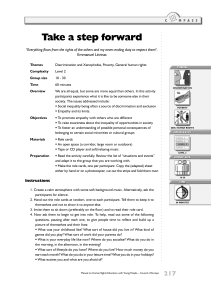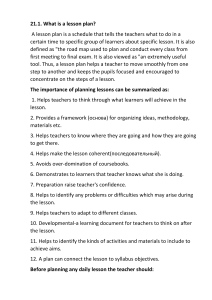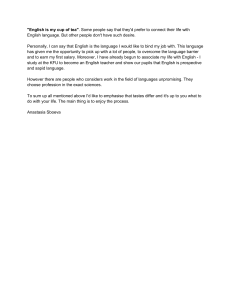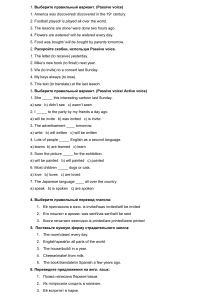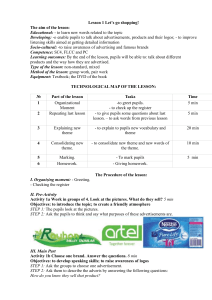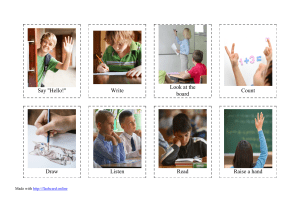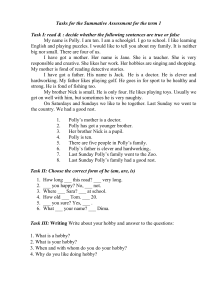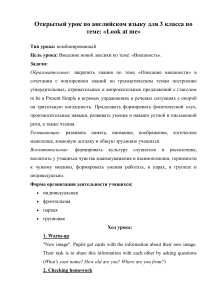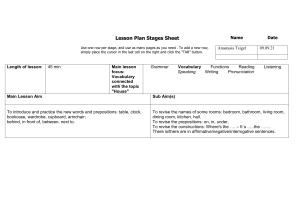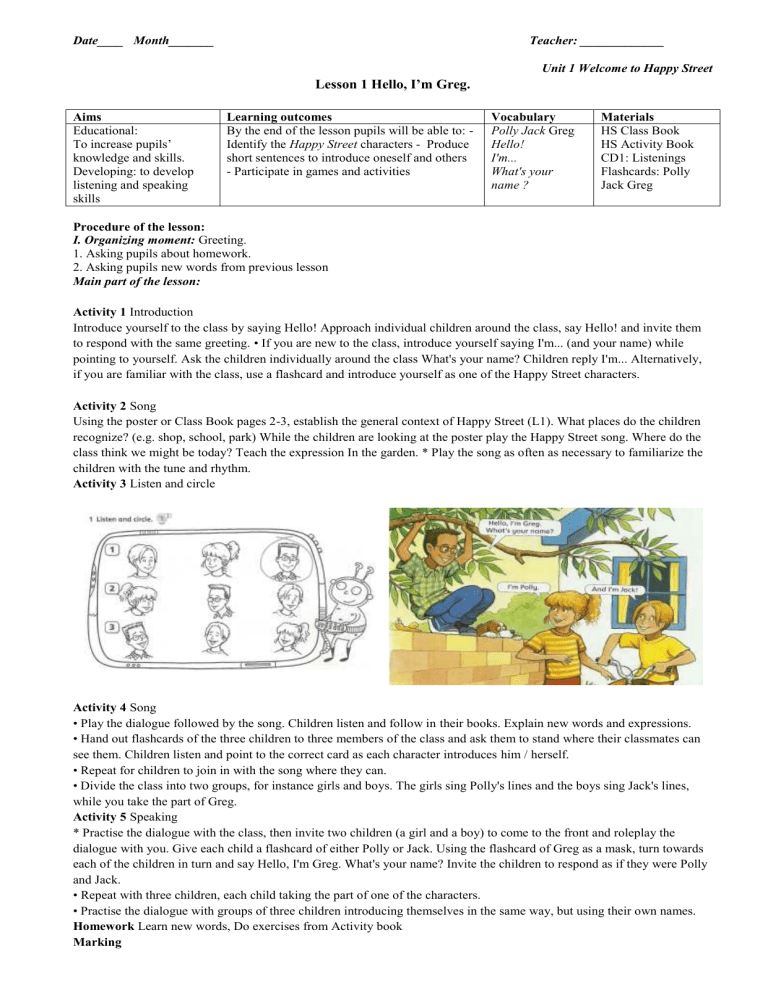
Date____ Month_______ Teacher: _____________ Unit 1 Welcome to Happy Street Lesson 1 Hello, I’m Greg. Aims Educational: Toimprove increasepupils’ pupils’ personal qualities like knowledge and skills. Developing: behavior to develop listening and speaking skills Learning outcomes By the end of the lesson pupils will be able to: Identify the Happy Street characters - Produce short sentences to introduce oneself and others - Participate in games and activities Vocabulary Polly Jack Greg Hello! I'm... What's your name ? Materials HS Class Book HS Activity Book CD1: Listenings Flashcards: Polly Jack Greg Procedure of the lesson: I. Organizing moment: Greeting. 1. Asking pupils about homework. 2. Asking pupils new words from previous lesson Main part of the lesson: Activity 1 Introduction Introduce yourself to the class by saying Hello! Approach individual children around the class, say Hello! and invite them to respond with the same greeting. • If you are new to the class, introduce yourself saying I'm... (and your name) while pointing to yourself. Ask the children individually around the class What's your name? Children reply I'm... Alternatively, if you are familiar with the class, use a flashcard and introduce yourself as one of the Happy Street characters. Activity 2 Song Using the poster or Class Book pages 2-3, establish the general context of Happy Street (L1). What places do the children recognize? (e.g. shop, school, park) While the children are looking at the poster play the Happy Street song. Where do the class think we might be today? Teach the expression In the garden. * Play the song as often as necessary to familiarize the children with the tune and rhythm. Activity 3 Listen and circle Activity 4 Song • Play the dialogue followed by the song. Children listen and follow in their books. Explain new words and expressions. • Hand out flashcards of the three children to three members of the class and ask them to stand where their classmates can see them. Children listen and point to the correct card as each character introduces him / herself. • Repeat for children to join in with the song where they can. • Divide the class into two groups, for instance girls and boys. The girls sing Polly's lines and the boys sing Jack's lines, while you take the part of Greg. Activity 5 Speaking * Practise the dialogue with the class, then invite two children (a girl and a boy) to come to the front and roleplay the dialogue with you. Give each child a flashcard of either Polly or Jack. Using the flashcard of Greg as a mask, turn towards each of the children in turn and say Hello, I'm Greg. What's your name? Invite the children to respond as if they were Polly and Jack. • Repeat with three children, each child taking the part of one of the characters. • Practise the dialogue with groups of three children introducing themselves in the same way, but using their own names. Homework Learn new words, Do exercises from Activity book Marking Date____ Month_______ Teacher: _____________ Lesson 2 Who’s this? Aims Educational: practise asking and answering simple questions Developing: To develop writing skills Learning outcomes By the end of the lesson pupils will be able to: Identify the Happy Street characters - Produce short sentences to introduce oneself and others - Read and understand a story text Vocabulary Who's this? It's... Daisy Otto Flossy Goodbye! Oh no! Materials HS Class Book Activity Book CD1: Listenings Flashcards: Greg Polly Jack Daisy Otto Flossy Procedure of the lesson: I. Organizing moment: Greeting. 1. Asking pupils about homework. 2. Asking pupils new words from previous lesson Main part of the lesson: Activity 1 Introduction Place the flashcards of Greg, Polly, and Jack on the board, and for each one ask Who's this? Do you know? Now hold up the flashcards of Daisy, Otto, and Flossy, and for each one ask Who's this? and say It's (Daisy), etc. Place these flashcards on the board with the others. Activity 2 Story Explain to the class that they are going to hear a story. With books closed play the story straight through and invite the class to tell you (L1) anything they can about it. Say to the class Open your Class Books at page 5. Hold up your book and ask Where's this? Remind children of the expression In the garden. Play the story again while the children follow in their books. Invite members of the class to read the story with you. Take the part of Greg. Repeat with different members of the class. Divide the class into groups of six, each child reading a different part. Allow enough time for children to swap roles so that everyone gets an opportunity to read all the text. Invite groups to come and act out the story at the front of the class. Activity 3 Listening Say to the class Open your Activity Books at page 4. Hold up your own book. Point to picture 1 in the first activity and ask Who's this? When the class answer It's Otto, use your finger to trace over the line leading to the picture of Otto below and say Yes. It's Otto. Do the same for picture 2, but this time children will have to guess who they think it is. Explain that the top row of pictures show the characters as babies, and that to find out who the babies are they must listen to the audio. Say Listen! (reinforce your instruction by putting your hand to your ear) and do the first example with the class. With pencils down, play the rest of the audio for children to match the 'photos' and the pictures by pointing only. Activity 4 Listening Hold up your Activity Book at page 4. Say Look at activity 2. Point to each of the pictures and invite the class to tell you (L1) what each character is doing. Explain that each of these activities makes a distinctive noise. Ask the children to make the noises they think the characters are making. Point to the text. Explain to the class that they are going to hear a noise on the CD and they must decide who is making the noise in order to circle the correct words. Do the first example with the class. Children continue the activity on their own. Repeat the audio as necessary. Homework Learn new words, Do exercises from Activity book Marking Date____ Month_______ Teacher: _____________ Lesson 3 Numbers Aims Educational: - review numbers one to ten - recognize and read number words Developing: develop writing skills - play Bingo Learning outcomes * use numbers 1-10 * sing a song * Read and understand a story text * read and understand a short story Vocabulary one two three four five six seven eight nine ten gome ball skittles Materials Class Book page Activity Book CD1: Listenings Flashcards: numbers 1-10 Procedure of the lesson: I. Organizing moment: Greeting. 1. Asking pupils about homework. 2. Asking pupils new words from previous lesson Main part of the lesson: Activity 1 Presentation • Hold up the flashcard of number '1' and put it on the board. Point to the card and say one. Do the same with '2'. Then look around you as if you have lost something and, with a puzzled expression, ask Where's three? Look around the room and invite the class to help you. Say Ah, three. Thank you! to the child who brings you number three. Repeat for the rest of the numbers up to 10. • Point to each of the numbers, first in order then at random, and invite the children to say each number as you point to it. Do this with the whole class and then with individual children. Activity 2 Song • Say Open your Class Books at page 6. Point to each of the characters and ask Who's th is?Then ask Where's this? See if the class can remember In the garden. Invite the class to tell you (L1) what the children are doing. Explain that in English this game is called skittles and you play it with a ball and ten skittles. Invite the class to count the skittles with you. • Close books and play the song. Invite the children to listen and raise their hands every time they hear a number. Repeat. This time children hold up the correct number of fingers when they hear each number word. Activity 3 Listening • Tell the children to point to the skittles at the bottom of the page, and demonstrate by holding up your own book. Explain to the class that they must listen to the CD and point to the correct skittles in their books as they hear the numbers on the audio. • Play the first line of the audio for the children to point to the correct skittles in their books. • When you are sure that all the children have understood the activity, play the rest of the audio. Repeat as often as necessary. Activity 4 Listening • Say Open your Activity Books at page 6. Hold up your own book and point to Quizzy in the first activity. Ask Who's this? In L1, ask the class if they have ever done this type of puzzle. Can anyone explain what they have to do? (Join the dots to reveal an object.) Can anyone guess what the object is going to be? Explain that they must listen to the CD, and join the numbers in the order they hear them. Homework Learn new words, Do exercises from Activity book Marking Date____ Month_______ Teacher: _____________ Lesson 4 Sophie’s world: How are you? Aims Educational: - to improve pupils’ knowledge and skills Developing: To develop writing skills Socio-cultural: learn about British culture Learning outcomes By the end of the lesson pupils will be able to: - read words and short phrases of greeting - practise exchanging greetings Vocabulary Hi! Bye! How are you? Fine, thanks. See you tomorrow! Materials Class Book Activity Book CD1: Listenings Procedure of the lesson: I. Organizing moment: Greeting. 1. Asking pupils about homework. 2. Asking pupils new words from previous lesson Main part of the lesson: Activity 1 Presentation Tell the class they are going to read about some new friends. Ask the children to open their Class Books at page 7, and to look at the photographs. What do they see? Where are the children? Who is meeting them? Play the audio straight through while the children listen. Point to the photographs in the Class Book and ask Who's this? in order and at random, for the children to give you the names of the characters. Play the audio again while the children follow in their Class Books. Activity 2 Reading Read out each exchange and invite the class to repeat after you. Invite the class to tell you what you say when you meet someone, and what you say when you're leaving them. Invite individual children to read out the exchanges. Divide the class into groups of four to practise the dialogues, changing roles each time. Monitor and listen to individual groups, helping particularly with pronunciation and intonation. Encourage the children to 'act' the dialogues not simply 'say' them, by using intonation and actions suited to the words on the page. Invite volunteers to come to the front and act out the dialogues for the whole class. Activity 3 Speaking • Invite four children to come to the front of the class and practise the exchanges, using their own names. Children do the same in their groups, swapping roles to give all the children a chance to become familiar with these key phrases for social interaction. Activity 4 Writing • Say Open your Activity Books at page 8. Point to the instruction and invite a volunteer to read it out for the class. Can anyone explain what they have to do? Point to the words in the box at the top of the page and invite another volunteer to read them out to the class. Do the first example together with the class. Ask Who's this? Is it George? (No, it's Sophie). Explain that they should fill in the missing word on the line. Run through the rest of the activity orally before the children work on their own to complete the speech bubbles in their books. Check answers as a class. Activity 5 Writing • Ask the children to look at the second activity. Point to the speech bubbles and ask What is she saying? For each. Run through the exercise orally before inviting the children to write the missing words in the speech bubbles. Monitor and help where necessary. • Check answers as a class. Homework Learn new words, Do exercises from Activity book Marking Ushbu to’garak konspektining to’liq variantini olish uchun +99891 180 0985 Telegram raqamiga yoki @hasanboy_uz telegram adresiga habar yozing Yoki +99891 180 0985 raqamiga qo’ng’iroq qiling Narxi 20 000 so’m To’lov click yoki payme orqali To’garak konspekti bilan birga Happy Street Class book, Activity book, Audio materiallar, test va tarqatma materiallar ham tashlab beriladi.

